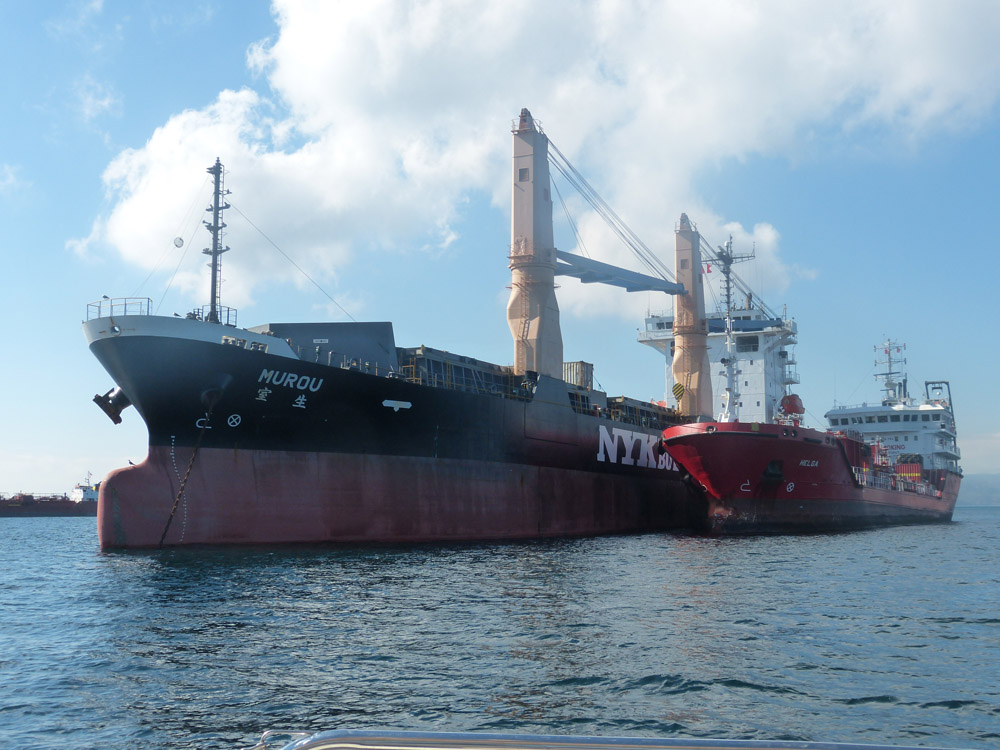Nov 04 – Gib Shipping Feature – An Interview With Masamichi Morooka
 By Paul Gonzalez-Morgan
By Paul Gonzalez-Morgan
Masamichi Morooka, Chairman of the International Chamber of Shipping (ICS) has been in the industry for over 40 years, working within the NYK Group. A proven expert in most aspects of shipping, his current ICS role requires finding the right balance between the members he represents and regulatory bodies and governments.
What would you consider your greatest achievement to date as Chairman of the ICS?
ICS rarely shouts about its achievements. Quiet efficiency is more the ICS style. Any success we have in persuading governments to take more account of the industry’s views is really due to the collective efforts of our member national shipowners’ associations, both in developing practical ICS policy positions and in encouraging their respective governments to listen to the ICS point of view.
But during my time as Chairman, I do think we have had some success in getting governments to finally understand the serious problems associated with the IMO Ballast Water Convention, especially the flaws in the IMO type-approval process for the really expensive treatment systems that shipowners will soon be required to fit.
Following a high-profile campaign, IMO agreed to adopt a Resolution last year which commits governments to resolving the problems raised by ICS, so that the Convention will hopefully be fit for purpose when it finally enters force.
Unfortunately, the different regime being applied in the United States is complicating things even further and making global implementation even more chaotic. The U.S. ballast water regime is already in force, but the U.S. has still not yet approved any treatment systems that shipowners can install with confidence. This is also delaying entry into force of the IMO ballast regime, because governments that have not ratified the IMO Convention will probably remain reluctant to do so until this mess in the U.S. is sorted out.
How did your years of experience in the shipping industry prepare you for your current role?
Through my many years in shipping, I have developed a deep appreciation of the need for shipping to be governed by an international regulatory framework. We are a global industry and without global rules we have chaos.
For an individual company, unilateral regulation, whether regional, national or local, can create big problems, affecting the efficiency of operations and a shipowner’s ability to compete fairly in international markets. First-hand experience of this has provided a solid foundation for my role as Chairman of ICS, which strives everyday to promote the global regulation of the shipping industry.
On a more practical level, I have previously spent a great deal of time working in the liner shipping sector, where I regularly attended consortia negotiations with shipping companies based in other nations. Through this process, I think I learned how to manage and conclude debates effectively and how to reconcile differences of opinion in order to reach consensus between different parties. This has also been very helpful when overseeing the adoption of ICS policy positions by our Board which must balance the interests of the different national associations.
What has been your most challenging moment?
I’m not sure that any one ‘moment’ stands out, however there have certainly been overarching challenges that have been particularly prominent. One of these has been addressing how the shipping industry’s CO2 emissions should be further regulated. There is immense pressure on governments to develop CO2 reduction measures for application to shipping, in addition to those technical and operational regimes already adopted by IMO. Engaging with governments to ensure that any further regulation is only developed at IMO for global application, and is proportionate to shipping’s contribution to the world’s CO2 emissions is an enduring challenge for ICS.
How concerned is the ICS with environmental protection?
Safety of life at sea must always be our greatest priority, but the protection of the marine environment is a very close second and it is actually environmental issues that take up most of ICS’s time, because this is what dominates the agenda of our regulators such as IMO.
For the past 40 years, ICS has very been influential in the development of MARPOL Convention and its Annexes, which comprehensively regulate all aspects of environmental performance from garbage management to sulphur emissions and CO2, not forgetting the need to prevent oil pollution of course. ICS has also participated actively in the development of the IMO Civil Liability Conventions covering compensation from oil spills, the Ballast Convention as we have discussed as well as the Hong Kong Ship Recycling Convention and things like the IMO Polar Code. ICS works hard to raise awareness of these regulations throughout the industry and develops practical guidance on how they can be best implemented.
We continue to witness mass migrations in unsafe craft in the Mediterranean Sea. In your view, what is the solution?
Shipowners and their crews have been deeply affected by this crisis, and merchant ships have already assisted with the rescue of over 65,000 people.
There are of course no easy solutions. The root causes are political and probably beyond our capacity to influence. But ICS has continued to press governments to dedicate additional search and rescue resources to the region, so as to prevent an over-reliance on merchant vessels to conduct large-scale rescues. Coming to the aid of anyone in distress at sea is a deeply held maritime tradition, as well as an obligation under international law. But merchant vessels and crews are not best equipped to conduct these large-scale rescues of hundreds of people at a time, nor should they be expected to be. The crews onboard our ships are seafarers, not search and rescue professionals. Something which is often overlooked is the impact that these rescues is having on our crews.
Piracy continues to be a global threat. Do you foresee a reduction in piracy attacks over the coming years and how can this be achieved?
Piracy is indeed a global threat, and we currently witnessing high levels of activity in West Africa and South East Asia. Of course there are important differences in the forms piracy can take in different regions, and the solutions that work in one area may not be applicable to another. But generally speaking, the reduction in the incidents off the coast of Somalia and in the Indian Ocean in recent years would seem to underline the importance of a multi-dimensional approach to tackling piracy. The compliance by the industry with its own Best Management Practices on preventing attack, together with the deployment of naval forces in the region, have led to a dramatic reduction in the number of attacks. That said, we cannot rest on our laurels and the possibility of a resurgence in Somali pirate activity cannot be written off.
In your view, what stresses will the shipping industry continue to face over the next 12/24 months?
In economic terms, it appears that the shipping industry will continue to face a difficult demand/supply imbalance, with slowdown in world trade as a result of continuing problems in the Eurozone and the economic slowdown in China dampening demand for shipping at a time of continued overcapacity in most trades. Although on the whole, demand does appear to be slowly recovering from the 2008 slowdown, it is doing so at a gradual and varied pace. The challenge of implementing new environmental regulations is one that the industry has faced and will continue to face moving forward. New IMO requirements for the use of low Sulphur fuel in Emissions Control Areas came into effect in January this year, and the industry is continuing to adjust to the new regime. Though issues still remain, not least with respect to the parallel regime in the United States, the IMO Ballast Water Management Convention is also expected to enter into force within the next two years. Complying with this new regulation will be a major adjustment for the industry.
What is your view of Gibraltar's shipping industry?
Gibraltar is an exciting maritime hub. The Gibraltar Ship Registry ranks amongst some of the best performing flags by most assessments, including the ICS Flag State Performance Table, and has done now for many years. The registry’s now attracting tonnage from a range of shipping sectors and owners from a wide spread of geographical locations. As a port, Gibraltar has of course always been a strategically significant hub, connecting as it does the Atlantic Ocean and the Mediterranean Sea. This is not about to change, and it is good that significant investment is being made into the development of the port’s services and the expansion of its capacity. This mutually beneficial relationship between Gibraltar and the global shipping industry would seem to me to have a very bright future.
More features and news can be found on: http://www.gibraltar-shipping.com

{fcomment}






